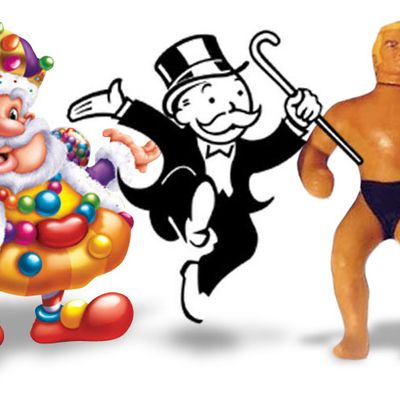
Last week, news broke that the board game Candy Land had been dumped by Universal Pictures and instead set up at rival Sony Pictures, now as an Adam Sandler vehicle. And with this departure, Universal had unloaded the last of its Hasbro-inspired projects (having washed their hands of Stretch Armstrong, Ouija, and Clue within the last six months); this ends — nearly two years early — the studio’s largely unproductive, multi-million-dollar deal with the world’s No. 2 toymaker. Signed in 2008, the pact originally anticipated a far-less-costly moviemaking world in which movie stars wouldn’t be the attraction, brands would. And yet: Candy Land has now been scooped up by another studio not because of the inherent attraction of the board game, but precisely because it would make a good vehicle for a big star. From this expensive and largely fruitless deal – the jury is still out on whether the $250-plus million adaptation of Battleship with no movie stars will end up like the Costa Concordia or rack up Titanic-size grosses – Hollywood can take a lesson not just about the dangers of relying too much on outside brand names, but also on the dangers of a studio looking for too quick a fix.
When the Hasbro deal with Universal was first announced, it was described in a joint statement as a “six-year partnership” that would produce “at least four feature films” based on “the greatest brands in the world” — games and toys like Monopoly, Battleship, and Stretch Armstrong would be the new tentpoles. The reaction from many in the creative community was scorn, followed by resignation: Had it come to this? A latex rubber doll filled with gelled corn syrup was now what passed for intellectual property?
Thankfully for these despondent types, next to nothing came of the deal. Even some Universal machers knew it was a bad idea at the time. “At least Stretch Armstrong was at one point an action figure,” says one former top exec in hindsight, “something you could build a story around. But what else is in the Hasbro catalogue that is iconic and translates to a feature film? Certainly not board games.” The success of DreamWorks and Paramount’s Transformers films likely inspired the deal, but there was a mythology behind those robots — or at least a history of kids smashing them into each other, making their own stories. What would the story be behind Ouija? Explains one top talent agent, “Sure, my kids played Battleship — but they didn’t even know what they were playing was ‘Battleship.’”
Current Universal execs privately admit the “partnership” that was to have run through 2013 is effectively dead, and besides Battleship, which comes out May 18, not a single Hasbro property mentioned in that 2008 press release remains at Universal in active development. Rather than continue to pay the contractually obligated punitive $5 million fines for each film it dithered on, the studio agreed to pay a single, enormous multi-million-dollar penalty just to get out of business with Hasbro. And as soon as it was finalized, Universal began shedding Hasbro projects like a Siberian Husky sheds fur after emerging from a kiddie pool. Only a day before Candy Land was kicked to the curb, Stretch Armstrong was sent packing, too; it’s now in development at Relativity Media, which is starting over at square one, without Taylor Lautner or super-producer Brian Grazer. Late in August, Universal dropped the Michael Bay–produced and McG-directed Ouija, which even Paramount Pictures — whom Bay has made billions for with Transformers — has passed on acquiring. Three weeks before that, Universal dropped Clue. (Perhaps someone remembered that in 1985 it had already been made as a movie with three possible endings, and that none of them ended well?)
It’d be easy to blame the onerous terms of the deal, and the inherent creative roadblocks. (Battleship is a giant action movie about a battleship officer leading a fight against aliens: Why did they even need a brand name for that? And even if at one point someone coyly utters the catchphrase, “You sunk my Battleship!” isn’t that a pop-culture reference that could have been made without paying millions in rights fees?) Yet Universal’s biggest underlying error in making the deal at all was trying to reverse a fifteen-year absence from family filmmaking with one single deal. Since the nineties, Universal’s attempts at big hits largely came from raiding the B-movie junk closet of horror that they owned. Sometimes it worked (The Mummy); but mostly they were costly misfires (The Wolfman, Van Helsing) that not only failed to spawn new franchises, but severely tarnished the studio’s own core brand. “It was an issue for years,” recounts our former Universal-ite. “Ever since [Steven Spielberg’s] Amblin had left the lot, that sort of big, tentpole family entertainment — E.T., Back to the Future — had disappeared from the place. At the time, Paramount had DreamWorks Animation; Disney had Marvel and Pixar — all generators of ‘big idea’ content. The hope was that Hasbro would be that for Universal, which had no existing franchises of its own.”
Yet it’s worth noting that the biggest successes Universal has had of late — the Bourne movies, Despicable Me, Bridesmaids — all came not from toys or games, but from books and original-thinking minds. Just like E.T. and Back to the Future. With Candy Land finally out of its system, here’s hoping Universal will recover from its insulin shock soon and get back to making the meat-and-potatoes entertainment that made it great all those years ago, and only fitfully brilliant of late.

